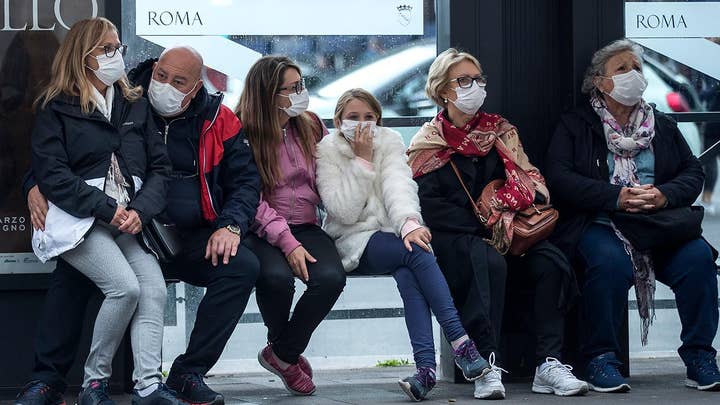Pence says major health insurance companies will waive copays for coronavirus tests, cover cost of treatment
Vice President Mike Pence leads coronavirus task force briefing from the White House.
President Trump’s top economic adviser said Tuesday that the White House hopes to eliminate the payroll tax at least through the end of the year as a way to boost the U.S. economy, struggling amid fears over the coronavirus outbreak.
Speaking during a press conference held by the White House coronavirus task force, the director of the National Economic Council, Larry Kudlow, was light on the exact figures of the president’s stimulus package but highlighted the “payroll tax holiday” along with assistance for workers with unpaid sick leave and tax deferrals for distressed industries as keys to the plan.
“We are working out details right now so I don’t want to quote any numbers right now,” Kudlow said. “The outline of the thing is very important. The payroll tax holiday is probably the most important part of this.”
TRUMP FLOATS TEMPORARILY ELIMINATING PAYROLL TAX
Kudlow acknowledged that the payroll tax makes up an enormous amount of the money that goes into the federal budget, but said that it would provide a “big growth pay off” to the economy and “help deal with the challenges over the next few months” as the country battles the outbreak of the coronavirus.
“The payroll tax holiday is a bold move and this has always been a bold president,” Kudlow said, adding that the money lost from temporarily eliminating the tax will be made up “with much better economic growth.”
The payroll tax generated $1.17 trillion – or 35.2 percent of all federal revenues – in the fiscal year 2018, according to a recent study by the Center on Budget and Policy Priorities. Most of the revenue from the tax goes to fund Social Security, Medicare, and other social insurance benefits.
The suspension of the payroll tax would drop the tax rate from 14.2 percent down to zero, with the Trump administration hoping the extra money in people’s paychecks will spur spending and boost an economy that has been on shaky ground since the outbreak of coronavirus in the U.S.
The president’s plan, however, is not a done deal as lawmakers on both sides of the aisle have their qualms with it.
CORONAVIRUS: WHAT YOU NEED TO KNOW
The president's GOP allies have been cool to additional spending at this stage, especially for cutting taxes that would have to be reimposed later — presumably after the November election. Democrats prefer their own package of low- or no-cost virus testing, unemployment insurance and sick pay for workers struggling to keep paychecks coming as the outbreak disrupts workplaces.
Much like Kudlow, Trump's team offered few specifics at the closed-door GOP lunch on the size of the payroll tax break or its duration, senators said. Trump has long promised to bring about an election year "tax cuts 2.0," and he seemed to be seizing on the virus fears as a way to bring about a victory on that front before November. Behind closed doors, he discussed the coming elections in swing states like Arizona and Montana where GOP senators face tough races.
In addition to payroll tax relief, Trump has said he wants help for hourly-wage workers to ensure they’re “not going to miss a paycheck” and “don’t get penalized for something that’s not their fault." He's also mentioned small-business loans. But details are slight.
“They didn't get into specifics,” said the No. 2 Republican, Sen. John Thune of South Dakota.
Increasingly, it appears a solution will originate in the House, where Speaker Nancy Pelosi told House Democrats they would keep working this week despite concerns about the risk of infection at the Capitol.
"We are the captains of the ship,” Pelosi said during a closed-door meeting, according to a person in the room unauthorized to discuss the private caucus and granted anonymity. “We are the last to leave.”
Trump tapped Treasury Secretary Steven Mnuchin to meet with Pelosi, whose support will be needed for any deal in the divided Congress, where Republicans hold the Senate majority but Democrats hold the House.
CLICK HERE TO GET THE FOX NEWS APP
Munchin declared the meeting with Pelosi “productive” and said they'd "work together on a bipartisan basis to figure out how we can get things done quickly.”
Pelosi insisted the “threshold” for any proposal must be its ability to respond to the virus. Her team was preparing to come out with a package in the next day or so.
Senate Majority Leader Mitch McConnell was noncommittal after the meeting with Trump, emphasizing the path forward rests in the talks between Mnuchin and Pelosi. "We’re hoping that he and the speaker can pull this together," he said.
The Associated Press contributed to this report.








